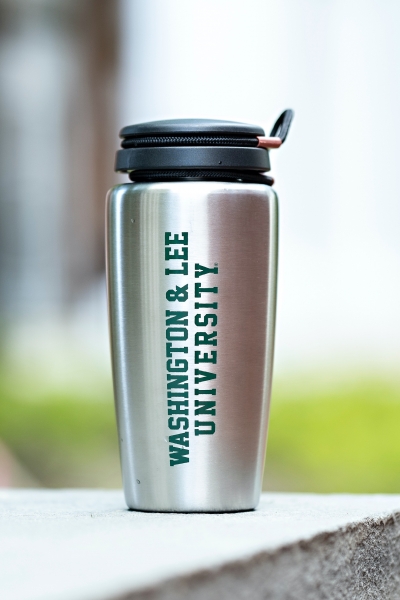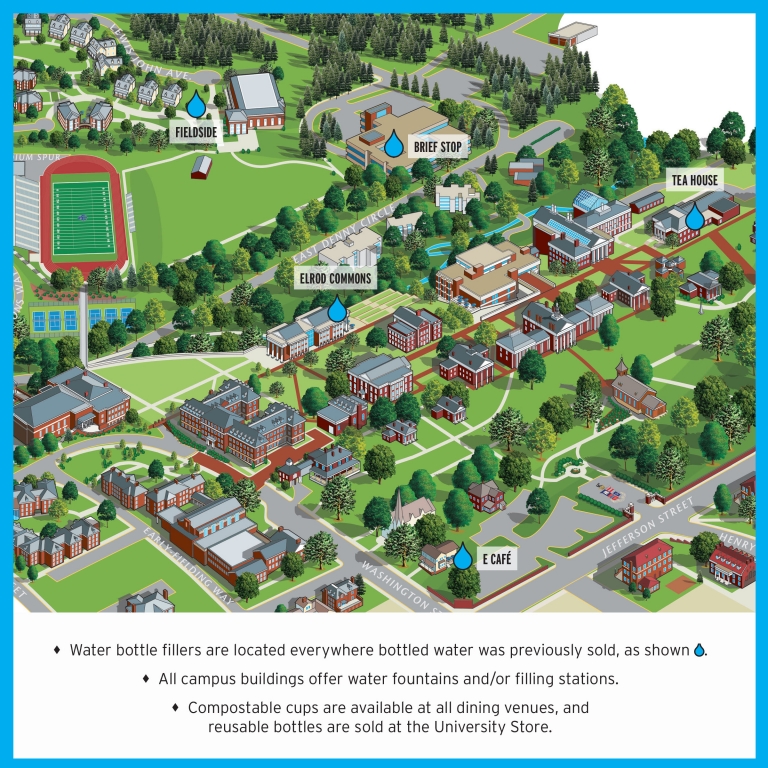W&L Ends the Sale of Disposable Water Bottles Office of Sustainability facilitates launch of new policy to help reduce single-use plastics

“The primary goal of this initiative is to eliminate waste on the front end. We are guaranteed to meet the basic goal simply by eliminating bottled water sales, and my hope is that we will see significant reduction in landfill waste as well. Ideally, this change will not prove to be inconvenient or stressful, but rather allow people to have their needs met while being part of the solution”
~ Jane Stewart
It’s been estimated that Americans purchase 50 billion bottles of water every year. On the Washington and Lee University campus alone, 11,410 single-use bottles of water were purchased during the 2021-22 school year.
Few would argue the convenience of buying a bottle of water and tossing it in the recycling bin once it’s empty. However, one must consider what went into producing that bottle, as well as what happens to it after it’s been used.
Making a single-use plastic water bottle requires three times more water than the amount that fits in that bottle, and 2,000 times the energy required to produce tap water for a similar size serving. Furthermore, projections indicate that in our lifetime the world’s oceans will contain more plastic than fish. If you find these estimates scary and want to be part of the sustainability solution rather than the problem, here’s an easy and cost-effective way to get started — skip the purchase of bottled water and simply carry a reusable water bottle that can be filled in multiple locations on the W&L campus.
This scenario has become a reality for the 2022–23 school year, as W&L has already eliminated the sale of single-use bottled water at retail locations on campus.
“Most of us are accustomed to thinking about recycling as a solution for reducing waste,” said Jane Stewart, W&L’s director of sustainability. “However, even when an item can be effectively recycled – and the recycle rate for plastics is only 9% – that doesn’t mitigate all the expense and environmental harm that came from producing the product in the first place. The best way to reduce what we send to the landfill is to be thoughtful at the front end and reduce unnecessary purchasing.”
With this in mind, Stewart and numerous campus leaders began investigating the viability of removing single-use plastics from the W&L campus. The initiative gained traction in March 2021 after then-Governor Ralph Northam signed Executive Order 77, a directive to phase out the use of single-use plastics in the Commonwealth of Virginia.
State agencies were ordered to begin removing single-use plastic items from their operations immediately. This order also applied to all state-supported academic institutions. As a private institution, W&L was not required to follow the order, but a number of schools within the Virginia Association for Sustainability in Higher Education were taking steps to meet the mandate, working together to share ideas and solutions. This proved to be a perfect opportunity for W&L to join the effort and make progress on our own campus.
“Most schools have contracts with the same one or two large suppliers, and this was an ideal moment for Virginia colleges and universities to work with these suppliers on rethinking bottled water sales, and more broadly, on offering more alternatives to single-use plastic packaging,” Stewart said. “With so many institutions voicing the same needs, the suppliers had a greater incentive to meet those needs.”
Stewart spoke with K.C. Schaefer, director of auxiliary services, and Ryan Miller, director of dining services, about the potential pitfalls and benefits of removing bottled water from campus. After conducting research on the subject, the group decided that eliminating the sale of these products was the right thing to do.
“Removing single-use plastic bottled water was a good first step,” Stewart said. “Our campus community will have access to water with the same convenience they had before – there are filling stations and fountains in nearly every campus building – but without the environmental damage associated with the plastic bottles. Using a reusable water bottle is also a much more wallet friendly option. A single plastic bottle of water can cost as much as five dollars. The savings from filling a reusable bottle instead of making that purchase every time you’re thirsty add up pretty fast.”
Stewart added that Schaefer and Miller were “amazing partners and extremely supportive” of the initiative, helping to develop wording for the recommendation to end bottled water sales on campus that ultimately went through the University Sustainability Committee for President Will Dudley’s review. With Dudley’s support, the plan has become a reality.
“I was excited to work with Jane on this initiative and to leverage the departments of auxiliary services to support this important effort,” Schaefer said. “It has been rewarding to see this project come to fruition, from its conceptual stages many months ago, to working with various campus partners to put all the details into place. I’m proud that W&L has supported this initiative and put it into practice.”
The auxiliary services staff in the university store and dining services have been hard at work preparing for the change, including negotiating details of the beverage contract, developing marketing materials and establishing additional locations for bottle-filling stations around campus.
Perhaps the most visible of these collaborative efforts involves providing cost-free reusable bottles to Washington and Lee students. In an effort to reduce waste, the university will give all first-year students a voucher to obtain a free reusable water bottle from the university store. Providing vouchers, rather than giving each student a bottle regardless of need, also helps eliminate waste.
“Many students will already have a bottle of their own and we didn’t want to hand out bottles to those who didn’t actually need or want one,” said Stewart. “The last thing you want in a waste reduction initiative is a bunch of unwanted items!”
These free bottles will connect the dots of sustainability, helping students understand the impact that they are having on campus. Students will also receive stickers made from environmentally friendly, plastic-free materials that feature facts related to plastic’s pollution to help draw the connection.
Additionally, W&L has created maps accessible through QR codes placed strategically around campus that detail the locations of bottle filling stations.
“The primary goal of this initiative is to eliminate waste on the front end,” Stewart said. “We are guaranteed to meet the basic goal simply by eliminating bottled water sales, and my hope is that we will see significant reduction in landfill waste as well. Ideally, this change will not prove to be inconvenient or stressful, but rather allow people to have their needs met while being part of the solution.”
Stewart noted that among the students she has spoken with, reaction to the plan has been uniformly positive, which didn’t surprise her.
“After all, they are a really smart group,” she added.
For additional information about Washington and Lee’s sustainability efforts, please visit the W&L sustainability website.
 Sample bottle that will be provided to students for free
Sample bottle that will be provided to students for free Water FIlling Stations Map
Water FIlling Stations Map
You must be logged in to post a comment.